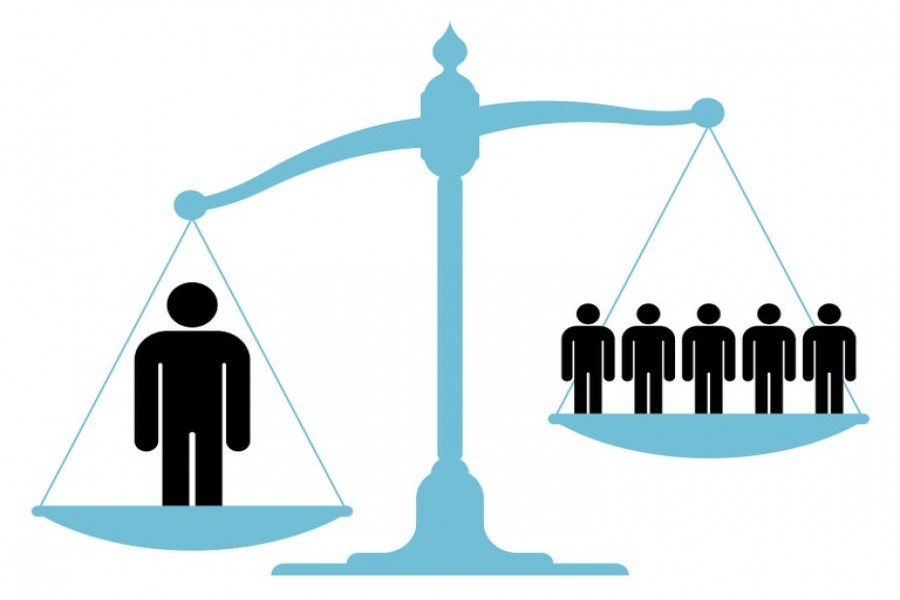The issuance of special cards to 10 million poor people, as announced by the prime minister, for purchasing some bare minimum essentials at subsidised rates is a pragmatic step in the context of market volatility. At the same time, it corroborates the fact that more people have critically lost their purchasing power on account of the post-pandemic turbulent price trend. In the situation, the government has started open market sale (OMS) of some of the common essentials registering abnormal price hikes from Trading Corporation of Bangladesh (TCB) trucks. Under this OMS programme, mainly cooking oil, sugar, lentil and onion are sold at subsidised prices.
However, another OMS programme involves the sale of food grains ---rice and wheat. Every day 216 metric tonnes of foodstuff ---189 metric tonnes of staple and 27 metric tonnes of wheat --- is sold in the open market from 54 trucks all across the country. In Dhaka City alone, 105 metric tonnes of rice and 15 metric tonnes of wheat are offered for open sale. From March 17, another 65 trucks will join the open sale fleet to raise the total foodstuff for daily sale at 476 metric tonnes, of which 59.5 metric tonnes will be wheat and the rest rice. Besides, the government has withdrawn 10 per cent value added tax (VAT) from import of cooking oil to help bring the price of the item down.
All such measures indicate that the government is no longer constrained by its earlier inaction when business syndicates started defying requests for keeping the market stable. Even there are instances that they unilaterally raised prices of some of the items in total disrespect for agreements reached at meetings with the government side only a day before.
When nothing proved equal to the task of reining in the galloping prices, lawyers drew the attention of the High Court to the unbridled price hike of cooking oil. The HC advised the lawyers to file a writ petition against the abnormal price of not only cooking oil but also of other essentials. On their filing the petition, the HC has issued directive to take punitive action against hoarders of imported cooking oil. Indeed the flurry of activities on the part of the government started following sudden artificial crisis of the item and also a further attempt to raise the already skyrocketed price on the pretext of war in Ukraine.
The net result is that the government slashed VAT on import of cooking oil but still its benefit is yet to be reflected on the price line. There was or still is no reasonable ground for raising the price of cooking oil because the consignments of edible oil that were in stock had their letters of credit (LCs) opened much earlier. Even those in the pipeline of import had the LCs opened at least three months before. So the traders have got with their way at the expense of consumers and that is literally on the eve of the World Consumers Rights Day on March 15. In case of the staple too, the same happened at the start of harvesting Aman paddy. They get what they want no matter if the government expects otherwise.
Both the authorities and consumers are made to dance to their tunes. Always they are calling the shots. Unless this comes to an end, it is impossible to bring order in Bangladesh market. Expenditure on foods in the country is one of the highest in the region. In the post-pandemic situation, a sharp decline in the purchasing power of the poor, low- and middle-income groups on account of inflation triggered by upward revision of fuel oils has only exacerbated their living condition. At the initial stage when there was no sign of a war in Ukraine, fuel price did not kick off this madly to more than $130 a barrel; but once the higher prices of fuel were announced, there was no stopping the business syndicates to raise almost all consumer goods' prices to record levels.
What escapes notice in the hustle and bustle is the erosion of incomes of people in the lower strata and even mid-level salaried people. A silent but sure process of social polarisation with yawning gaps in incomes is gaining momentum. The rich are getting richer and the pandemic time was no exception. If the wealth creation had its rational distribution among the population, this inflation would not make a dent in people's purchasing capacity. This is perhaps the poisonous fruit of free market economy every society is now reaping.
The automation of productive systems including that of agriculture unfolds a really ominous spectre. With the artificial intelligence (AI) ruling the roost in the fourth industrial revolution (4IR), the rich-poor gap is all set to widen further. This indeed is not a welcome prospect for any society.
In its second ruling the HC has directed the authorities to reply to the query why an order would not be issued for inclusion of the basic victuals such as rice, wheat, cooking oil, onion etcetera in the OMS policy guidelines to be sold on issuance of ration cards.
Indeed this may be a stopgap arrangement until the market stabilises. A full-fledged rationing system may still serve the low-income group even long after things normalise. But to address the acuter problem of social polarisation, more radical and innovative policies are in demand. This concerns planning with the population. The challenges of turning people into productive human resources by virtue of appropriate education and training have to be met before it is too late.


